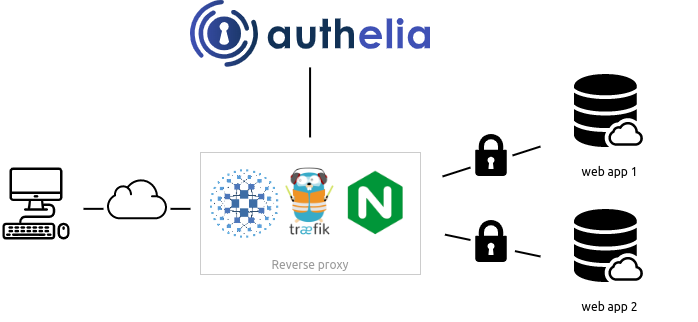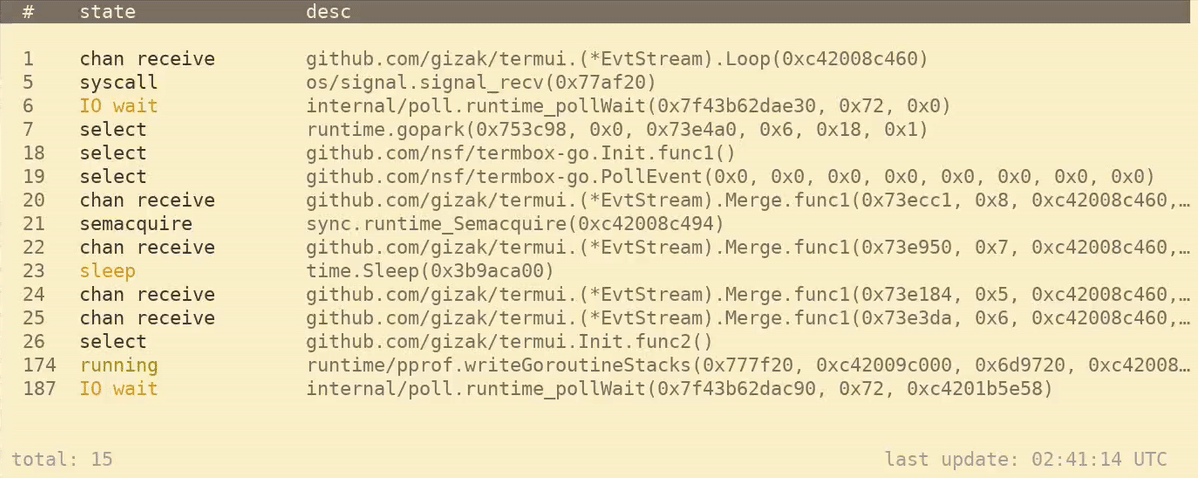这里记录每周值得分享的 Go 语言相关内容,周日发布。
本周刊开源(GitHub:[polaris1119/golangweekly](https://github.com/polaris1119/golangweekly)),欢迎投稿,推荐或自荐文章/软件/资源等,请[提交 issue](https://github.com/polaris1119/golangweekly/issues) 。
鉴于一些人可能没法坚持把英文文章看完,因此,周刊中会尽可能推荐优质的中文文章。优秀的英文文章,我们的 GCTT 组织会进行翻译。

题图:Go 官方 2020 年开发者调查报告。报告详细内容可以阅读翻译版:[Go 官方 2020 年开发者调查报告](https://mp.weixin.qq.com/s/mw3ktRLNL9H4m32Es_nU_A)。
## 刊首语
以下程序输出什么?
```go
package main
import (
"fmt"
)
func main() {
ch := 'b'
fmt.Println(ch/2.0)
}
```
A:编译错误;B:49.0;C:49
## 谁在招 Gopher
整理近期的 Go 职位。有招聘需求可以到「Go招聘」发布!
1、[单身的Gopher快来‘探探’路](https://mp.weixin.qq.com/s/wCMKDJfcZQ0gAaLIjqXr7A)
2、[计算机系统最底层、最具挑战的领域招 Go,敢不敢来?](https://mp.weixin.qq.com/s/N8J7V_GHjXR5F7bpJH2wLg)
3、[360 加大 Go 招聘,Go 形势大好!你来吗?](https://mp.weixin.qq.com/s/F5SP2s1PrEHx_3IyszCC1Q)
4、[什么?腾讯招前端竟然希望熟悉 Go](https://mp.weixin.qq.com/s/a_fYCkgzmVkieU8YvreJ-w)
5、[珠海怎么样?好几个 Go 相关职位等你来](https://mp.weixin.qq.com/s/11wwK7L1Sfh_64eHVQAPUg)
## 资讯
1、[Go1.16.2 和 Go1.16.1 发布](https://studygolang.com/dl)
参考:[快一个月,Go1.16 才发现了比较严重的 Bug,但这个 Bug 有点 Low。。。](https://mp.weixin.qq.com/s/AddZm8qaWBY-Hgexq6tWkA),以及文章 [为什么 Go1.16.1 发布的第二天又发布 1.16.2?](https://mp.weixin.qq.com/s/mbMCxhmz8pF8VUMKm3XYtA)。
2、[pixelizer 2.0 发布](https://github.com/eleby/pixelizer)
高效的图片素化器。
3、[TinyGo 0.17.0 发布](https://github.com/tinygo-org/tinygo/releases/tag/v0.17.0)
适用于嵌入式。
4、[vscode-go 将 staticcheck 作为默认 lint 工具](https://github.com/golang/vscode-go/commit/fd0328225d16ecc97e09e72c8c354cf106928984)
目前默认是 golint。
5、[图书《Go 语言编程之旅》开源](https://golang2.eddycjy.com/)
我和煎鱼写的图书,免费让大家阅读。感谢支持!
6、[Go 文档和代码阅读神器 Golds 已更新到 0.2.x 版本了](https://mp.weixin.qq.com/s/uVX1hQzE6Qc0p-JiTd5ytQ)
Go101 作者出品。
7、[Kubernetes 稳定性保障手册 -- 极简版](https://mp.weixin.qq.com/s/Udl25deXsEo7qc_2MAmpFg)
Kubernetes 在生产环境中的采用率越来越高,复杂度越来越高,由此带来的稳定性保障的挑战越来越大。
## 文章
1、[Go:死锁是如何触发的?](https://mp.weixin.qq.com/s/ZezoXyGn0HA-8j7yForU6Q)
死锁是当 Goroutine 被阻塞而无法解除阻塞时产生的一种状态。Go 提供了一个死锁检测器,可以帮助开发人员避免陷入这种情况。
2、[polarisxu 对话无闻](https://mp.weixin.qq.com/s/RZdSx8C36QdG59XdqQ2svg)
无闻是怎么学习 Go 的?
3、[虽然有争议,但 Go 还是需要泛型的](https://mp.weixin.qq.com/s/UEGI0Zl6XuSGLDzMG6tnng)
不喜欢你可以选择不用。
4、[究竟是什么让Go语言成为恶意软件作者的最爱](https://mp.weixin.qq.com/s/Q1MfJuBKgUEX3w3raneA8g)
最大的惊喜是当我们得知 Go 被用于编写恶意软件时。您无法控制谁将使用您的作品或他们将如何使用它。
5、[Go 中定时器实现原理及源码解析](https://www.luozhiyun.com/archives/458)
本文使用的 Go 的源码 15.7,需要注意的是由于 timer 是 1.14 版本进行改版,但是 1.14 和 1.15 版本的 timer 并无很大区别。
6、[Golang 在即刻后端的实践](https://mp.weixin.qq.com/s/cepoYJR5Xeloan31-D1iQg)
随着业务变迁,即刻后端服务内积累了大量的陈旧代码,维护成本较高,代码重构甚至重写被提上了日程。相比起 Node.js ,Golang 有着一定的优点。由于即刻后端已经较好地服务化了,其他业务在 Go 上也有了一定的实践,直接使用 Go 重写部分即刻服务是一个可行的选择。在此过程中我们可以验证在同一个业务上两种语言的差异,并且可以完善 Go 相关的配套设施。
## 开源项目
1、[netaddr](https://github.com/inetaf/netaddr)
一个更好的 IP 地址类型。
2、[authelia](https://github.com/authelia/authelia)
一个开源的认证和授权服务器,为你的其他应用程序提供 2FA 和 SSO。

3、[marcel](https://github.com/davidbanham/marcel)
一个以原始 MIME 格式生成符合 IETF 的电子邮件的库。
4、[fsql](https://github.com/kashav/fsql)
使用类似 sql 的查询搜索文件系统。

5、[goovus](https://github.com/nofeaturesonlybugs/goovus)
Go 包/module vanity url 服务器。
6、[pg](https://github.com/go-pg/pg)
Go ORM库,专注于 PostgreSQL 的特性和性能。
7、[kglb](https://github.com/dropbox/kglb)
dropbox 开源的用 Go 开发的基于 ip_vs 的四层负载均衡器。
8、[cosign](https://github.com/sigstore/cosign)
为镜像库中的容器签名,验证和存储,sigstore子项目。
## 资源&&工具
1、[gopherdoc](https://github.com/ravener/gopherdoc)
带语法高亮的 go doc。
2、[ego-demo](https://github.com/myteksi/ego-demo)
如何用 Go 为 envoy 构建一个 Filter。
3、[paper](https://songlh.github.io/paper/gcatch.pdf)
自动检测和修复 Go 软件系统中的并发性错误。
4、[grmon](https://github.com/bcicen/grmon)
goroutine 的命令行监控工具。

5、[fstabfmt](https://github.com/xyproto/fstabfmt)
格式化 /etc/fstab。
## 订阅
这个周刊每周日发布,同步更新在[Go语言中文网](https://studygolang.com/go/weekly)和[微信公众号](https://weixin.sogou.com/weixin?query=Go%E8%AF%AD%E8%A8%80%E4%B8%AD%E6%96%87%E7%BD%91)。
微信搜索"Go语言中文网"或者扫描二维码,即可订阅。

更多评论
* [The Go Programming Language Specificatio - Representability](https://golang.org/ref/spec#Representability)
> A constant x is representable by a value of type T if one of the following conditions applies:
>
> x is in the set of values determined by T.
T is a floating-point type and x can be rounded to T's precision without overflow. Rounding uses IEEE 754 round-to-even rules but with an IEEE negative zero further simplified to an unsigned zero. Note that constant values never result in an IEEE negative zero, NaN, or infinity.
T is a complex type, and x's components real(x) and imag(x) are representable by values of T's component type (float32 or float64).
* [The Go Blog - Constants](https://blog.golang.org/constants)
> The concept of untyped constants in Go means that all the numeric constants, whether integer, floating-point, complex, or even character values, live in a kind of unified space. It's when we bring them to the computational world of variables, assignments, and operations that the actual types matter. But as long as we stay in the world of numeric constants, we can mix and match values as we like.
> A constant may be given a type explicitly by a constant declaration or conversion, or implicitly when used in a variable declaration or an assignment or as an operand in an expression. It is an error if the constant value cannot be represented as a value of the respective type.
> An untyped constant has a default type which is the type to which the constant is implicitly converted in contexts where a typed value is required, for instance, in a short variable declaration such as i := 0 where there is no explicit type. The default type of an untyped constant is bool, rune, int, float64, complex128 or string respectively, depending on whether it is a boolean, rune, integer, floating-point, complex, or string constant.
无类型常量(untyped constant)2.0被转为rint32类型值2;
(int32)98/(int32)2 = (int32)49
#1

